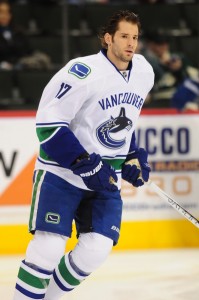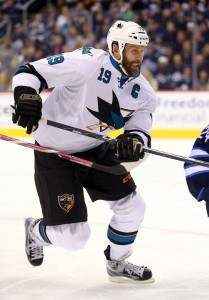Chicago Blackhawks trade rumors are all over the place these days, particularly when it comes to discussing potential second-line center candidates. Ryan Kesler and Joe Thornton’s names have been linked to the team for several weeks, with most in hockey circles around the Windy City clamoring for Stan Bowman to do whatever it takes to finally get Patrick Kane a legitimate center.
The excitement over names like Thornton and Kesler is understandable. Images of Michal Handzus’ miserable ineffectiveness on the second line throughout 2013-14 are difficult to forget, and it wouldn’t be unfair to suggest that Joel Quenneville’s unwillingness to decrease Handzus’ role until too late was the biggest reason the Blackhawks fell to the Los Angeles Kings in the Western Conference Final.
All the same, Chicago should shy away from the Kesler and Thornton trade discussions.
Chicago Blackhawks Trade Rumors: Avoiding Kesler, Thornton, and Other Big Names
Those who are gung ho on the Blackhawks prying an elite center away from another team are making a classic error that has been committed across all sports for decades. It is the mistake of present centricity, or overemphasizing immediate results at the cost of future opportunities.

Reasons for caution regarding Thornton, Kesler, and other big name centers on the market such as Jason Spezza aren’t very difficult to come up with. The Blackhawks’ impending salary cap problems are well-documented. Jonathan Toews, Patrick Kane, and Brandon Saad are each due sizable raises after next season that will aggregately require $10 million or more in cap space than the trio currently takes up. Chicago will be right up against next year’s cap ceiling as it is; the Toews, Kane, and Saad extensions will necessitate clearing some room, and even just one more big contract on the books makes that far more difficult.
Another factor to consider is one common to all trade discussions: whether what is received is even worth what was given up for it. Reports suggest that the Blackhawks offered Teuvo Teravainen and Andrew Shaw for Kesler, with the Canucks declining and proposing a counteroffer with Brandon Saad in Shaw’s place.
The second deal is especially awful for Chicago, but the first should never have been on the table either. The Blackhawks’ depth down the middle is so dreadful that Teravainen — he of the 3 total NHL games — is undoubtedly the third best center in the organization and perhaps even the second. Shaw, meanwhile, is Chicago’s only offensively capable center with NHL experience other than Toews. Giving both players up for Kesler solves the second line-pivot conundrum, but guts the center depth for a roster that had almost none to begin with.
Details on Thornton have been a little harder to come by, but his $6.75M cap hit crosses him off as a trade option from the start. We can presume that the Sharks would not be interested in retaining much of his salary in light of some recent news out of the Bay Area.
Financially speaking, the Blackhawks would need a near miracle to bring another big contract into the fold without being forced to gut the roster. The bizarrely popular hypothetical Patrick Sharp for Kesler swap being tossed around by fans is senseless; not only is it a lateral move at best for Chicago (and more likely an outright downgrade), but it also makes no sense for the rebuilding Canucks.
The Blackhawks Need to Keep Teuvo Teravainen

Teravainen is Chicago’s most valuable trade asset, but that doesn’t mean he has to be dealt. The 19-year-old Finn is the team’s unofficial second-line center of the future, possessing one of the most refined offensive games of anyone in his draft class. His entry-level contract could be tremendously useful for the cash-strapped Blackhawks, as he will only carry a $925k cap hit for each of the next three seasons.
The situation with Teravainen calls to mind the 2009-10 season in which Chicago won the Stanley Cup with Toews and Kane still on their first contracts. The advantages of having elite players for a relatively minimal cost were and are obvious; that Blackhawks roster boasted three first-pairing defensemen as well as a first-line winger playing on the third line.
Keeping Teravainen rather than flipping him for a quick fix on the second line is the best course here. He may be ready to handle a scoring role as soon as this coming season if given the right set of wingers. Patrick Sharp and Marian Hossa would be a good fit on his left and right; Teravainen’s best trait is his vision and passing, and those two players are Chicago’s best natural goal scorers. This would also allows Kane and Saad to remain on a line together and continue developing the dynamic chemistry that they displayed in Games 5-7 against Los Angeles.
The Blackhawks aren’t simply looking to win one more Stanley Cup and then fade into the background. This is a team built to contend for close to the next decade, with many prospects and pieces already in place to take on the roles of aging players. In a salary cap world, perpetual championship contention requires a strong nucleus of players supplemented by a consistent stream of prospects and young talent. Selling out for a Thornton or Kesler type completely breaks away from this strategy and consequently shortens the Blackhawks’ window significantly.
A More Viable Solution to the Second-Line Center Problem
Brad Richards is the best bet, still a very capable offensive player coming off a 20-goal, 50-point season with the New York Rangers. He isn’t perfect, but no option is; the ideal is to get the most for the least, and Richards is a free agent that wouldn’t cost any asset other than cap space to acquire. It seems plausible that he would strongly consider a short deal at a discount for a team on the cusp of another championship.
If not Richards, then there are other options that make more sense than entering the trade market for a big name. The Blackhawks would be fine even if they elect to stand pat; one must not forget that Chicago was one lucky bounce from playing in a Stanley Cup Final against an overmatched Rangers team, and that defense — not offense, nor the hole at second-line center — was the chief issue for the team last season.
Don’t get too hung up hoping for Blackhawks fireworks this offseason. No big news will be good news.